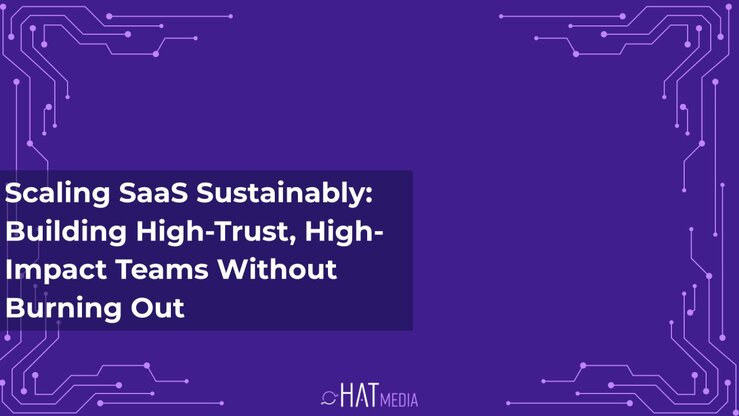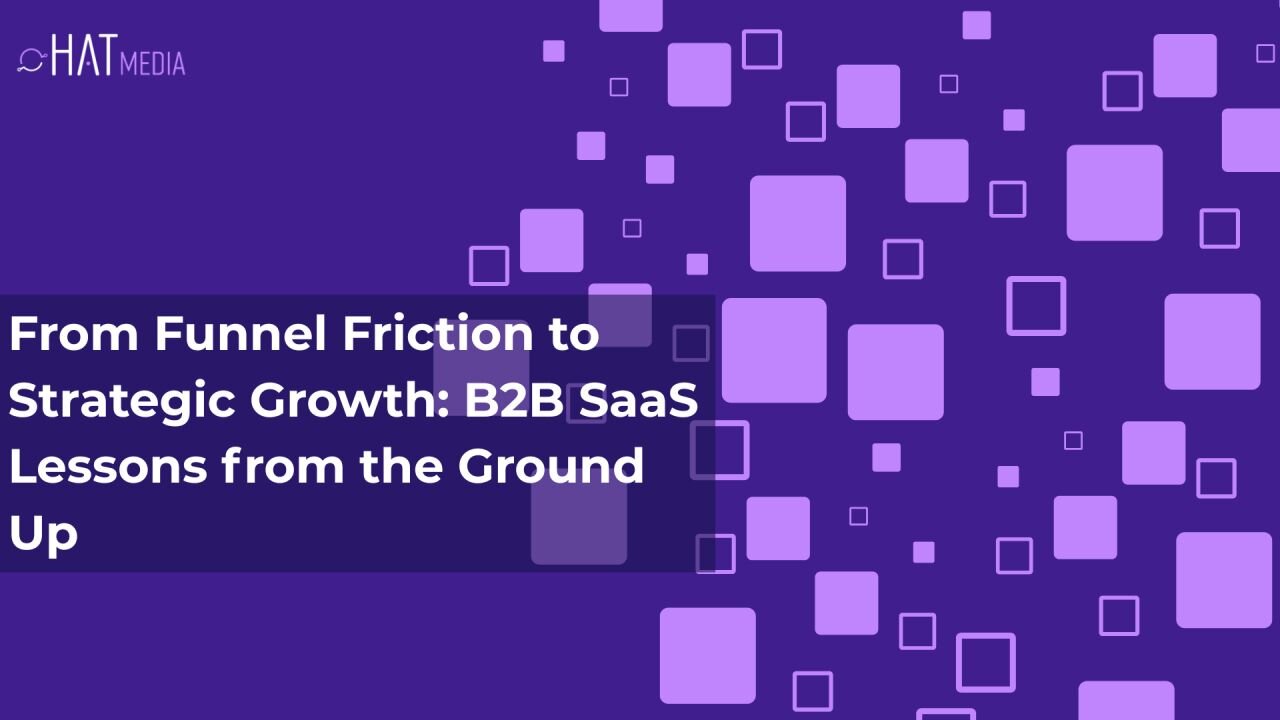Scaling SaaS Sustainably: Building High-Trust, High-Impact Teams Without Burning Out

We hear it all the time in SaaS circles: “move fast and break things,” “hire fast, fire faster,” “growth at all costs.” But what if there was another way?
In this episode of SaaS Stories, Joana Inch sat down with Natalie MacLees, co-founder of product studio N Squared, who’s taken a very different approach, one rooted in clarity, intentionality, and doing things well, not just fast.
Natalie and her co-founder have built a profitable, remote-first, values-led team without outside funding and without chasing hypergrowth. And along the way, they’ve uncovered powerful truths about what it really takes to build a sustainable SaaS business, one that doesn’t burn out its people or its purpose.
We will discuss the systems, beliefs, and strategies that underpin the kind of company many founders actually want to build, but rarely see reflected in the headlines.
Interested in hearing the full conversation? Watch the Full Episode
1. Growth ≠ Headcount. Clarity is the Multiplier.
One of the clearest themes from the episode: size doesn’t equal strength. N Squared intentionally capped their team at 20 people. Why? To preserve autonomy, communication, and focus.
“We didn’t want to grow just to grow. We wanted a company that felt healthy and human.”
That limit forced hard choices but also unlocked sharper decision-making, more trust in the team, and faster iteration. When everyone knows what matters and where the business is going, scale happens through clarity, not chaos.
2. Hire for What’s Hurting You Right Now
Natalie shared a smart insight on early hiring: don’t hire based on a theoretical org chart hire based on what’s blocking you today.
Their first hire wasn’t a marketer, or salesperson, or senior dev. It was a customer support lead.
“We were spending hours every day answering tickets which meant we weren’t building. That hire freed us up to move forward.”
If you’re in the early stages, look at where your time is leaking. Who can take over a critical but repeatable task, so you can get back to growing?
It’s not glamorous but it’s effective.
3. Culture Is a System, Not a Mood
Culture can feel fluffy until it’s not.
In the podcast, Natalie broke down how they codified culture into everyday practice:
- Using EOS (Entrepreneurial Operating System) to set quarterly priorities
- Defining 10 internal values that guide hiring and performance
- Creating clear, realistic boundaries for work hours and responsiveness
- Holding regular check-ins, retrospectives, and 1:1s
This isn’t overengineered. It’s deliberate. Because without a shared rhythm and language, remote teams drift fast.
“We hire adults. That means we don’t micromanage, but we do set expectations.”
4. Autonomy Thrives on Clarity, Not Vibes
Giving people freedom without structure doesn’t create autonomy, it creates confusion.
Instead, autonomy needs:
- Defined outcomes (“what does success look like?”)
- A clear roadmap (“what are we working toward?”)
- Communication rhythms (“how do we stay in sync?”)
Natalie described how her team uses quarterly “rocks,” scorecards, and light-weight project tools to keep things aligned without resorting to daily check-ins or tracking mouse movement.
It’s a model that trusts people, but also gives them the direction they need to execute confidently.
5. Work–Life Balance Starts at the Top
One of the most powerful insights in the episode wasn’t about systems, it was about modelling behaviour.
“We can’t say we respect work–life balance and then email our team at 9pm on a Saturday. That doesn’t add up.”
In fast-moving SaaS environments, especially small teams, founder energy sets the tone. Natalie and her co-founder are intentional about protecting team health including their own.
This includes:
- Async work as default
- Clear time-off boundaries
- Mental health support and compassion as part of 1:1s
And no surprise this helps with retention, engagement, and performance.
6. Systems Free People Up, They Don’t Box Them In.
There’s a fear in startups that too much process kills creativity. But Natalie made a strong case for the opposite.
“The right systems don’t slow us down, they stop us from solving the same problems over and over again.”
From onboarding checklists to support workflows to how they prioritise dev work, repeatability is a theme. But the process isn’t rigid. It’s human-first.
The result?
- Faster delivery
- Fewer mistakes
- More time for deep work
Startups often confuse “scrappy” with “sloppy.” The best teams use processes to focus energy, not to control people.
7. Hire People, Not Positions
One of the most practical points Natalie shared was around hiring: they don’t just hire to fill a role they hire to grow the company.
That means asking candidates:
- What else are you good at, besides your main skill?
- What do you want to learn here?
- How do you like to work?
They’ve brought on people who’ve transitioned roles over time, added new strengths to the team, or deepened expertise in places no one had planned for.
It’s a lesson in hiring for potential, not just the job description, especially in small teams where flexibility is gold.
8. Great Support > Great Marketing
N Squared isn’t a marketing-heavy company. They don’t run big ad campaigns or sponsor conferences. Instead, they invest in excellent, human support and that drives word-of-mouth and long-term loyalty.
Natalie mentioned how many of their reviews talk more about the people behind the product than the features themselves.
“People don’t just remember what your product does. They remember how you made them feel when something went wrong.”
If you want to grow quietly but powerfully, support is your leverage.
9. Accessibility Isn’t Optional. It’s Leadership.
Natalie is a vocal advocate for digital accessibility not just because it’s ethical, but because it’s practical.
Accessible products:
- Reach more users
- Perform better on SEO
- Are more usable for everyone
- Reduce legal and compliance risk
But most of all, building accessibly from the start forces clarity and simplicity, which are good design principles for everyone.
“If your product can be used by someone with a screen reader, it’s going to be easier for everyone to use.”
It’s a mindset shift: build for inclusion, not retrofitting.
10. You Can Build a Meaningful SaaS Without Playing the VC Game
The biggest message from this episode? You don’t have to follow the traditional tech playbook.
N Squared is profitable, sustainable, remote-first, and values-driven. They don’t chase blitzscale. They don’t raise funding. They don’t burn out.
“We didn’t want to build a unicorn. We wanted to build a company that supports great people doing great work.”
And they’re not alone. More founders are questioning the pace and pressure of SaaS norms and choosing to build quieter, more intentional companies instead.
If that’s you? This conversation is your permission slip.
Final Thoughts
You don’t need a billion-dollar valuation to build a successful SaaS business. You need:
- A strong foundation
- A healthy team
- Clear priorities
- Systems that scale with you
- And a vision that lasts beyond the next funding round

